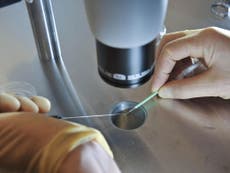IVF clinics must not be allowed to exploit childless families for profit
As the number of private clinics offering help with conception grows, they must be careful not to offer treatments whose claims are untested – and which even may be damaging

Despite the rise in the number of people who happily go through life – married, partnered or single – without any offspring, having children and a family remains the great goal for the majority of humankind. That is why medical advances in recent decades in the field of fertility, which have been the salvation of countless childless families, should be welcomed.
However, all is not entirely rosy in the world of IVF, as growing demand ups the pressure on those providing the treatments to offer ever more imaginative and speculative remedies.
As we report today, experts are becoming increasingly concerned that some private clinics are offering treatments that are either unnecessary, whose claims are untested, or which are invasive and even damaging to women’s health, violating the profession’s golden rule: do no harm to the patient.
Most of this concern centres on the offer to women of drugs suppressing their immune cells, use of which is based on a theory that some women cannot conceive or sustain a pregnancy because their bodies, in a sense, attack the foetus.
This theory remains highly contested, however, and there have been some cases of these drugs making women ill by depriving their bodies of the ability to combat infections.
Most of the evidence – admittedly anecdotal – suggests that private clinics are guilty of being over-eager to supply desperate patients with solutions. Indeed, the clinics are not necessarily entirely at fault here. The social climate in which they operate is an important factor.
The number of couples marrying later in life in the UK is growing. The average British woman back in 1970 got married at the age of 22. Now it is well over 30. Pressure is mounting on the medical field to supply solutions to women who are suddenly in a hurry to conceive in their mid or late thirties, after their natural fertility cycle may have passed its peak.
We also live in an age in which people do not like to take no for an answer. Some couples may be reluctant to face the fact that there may be no simple answer to their fertility issues. If one treatment does not work, the temptation is to demand another.
There is almost certainly a good deal of complicity between clinics wanting to test new, hopeful-sounding drugs or treatment options and patients willing to go to almost any length to conceive a long awaited child.
However understandable this pressure to experiment from all sides may be, the onus lies on the clinics – not the patients – to be the voice of realism. They must rein in expectations and, if need be, dash hopes.
It is important for IVF clinics to inform potential clients that, for all the talk of breakthroughs and seismic advances in our understanding of fertility, the rate of real progress has been more modest than many believe. Even now, the number of births in the UK that result from IVF treatment is minute, about 2 per cent of the total.
It is even more important to bear in mind that only a small minority of women who use IVF actually conceive – around a quarter. The percentage of women who give birth as a result of IVF treatment has also not risen that much in 25 years, which should give those who talk of “breakthroughs” pause for thought; was 14 per cent back in 1991.
Of course, doctors working in the world of reproductive assistance, like those working in any other field of medicine, should pioneer new treatments. That way progress lies.
But they must be extra-careful in the way they package and promote these treatments. The difference between offering vulnerable women hope and exploiting their desire to conceive a child is small indeed.



Join our commenting forum
Join thought-provoking conversations, follow other Independent readers and see their replies